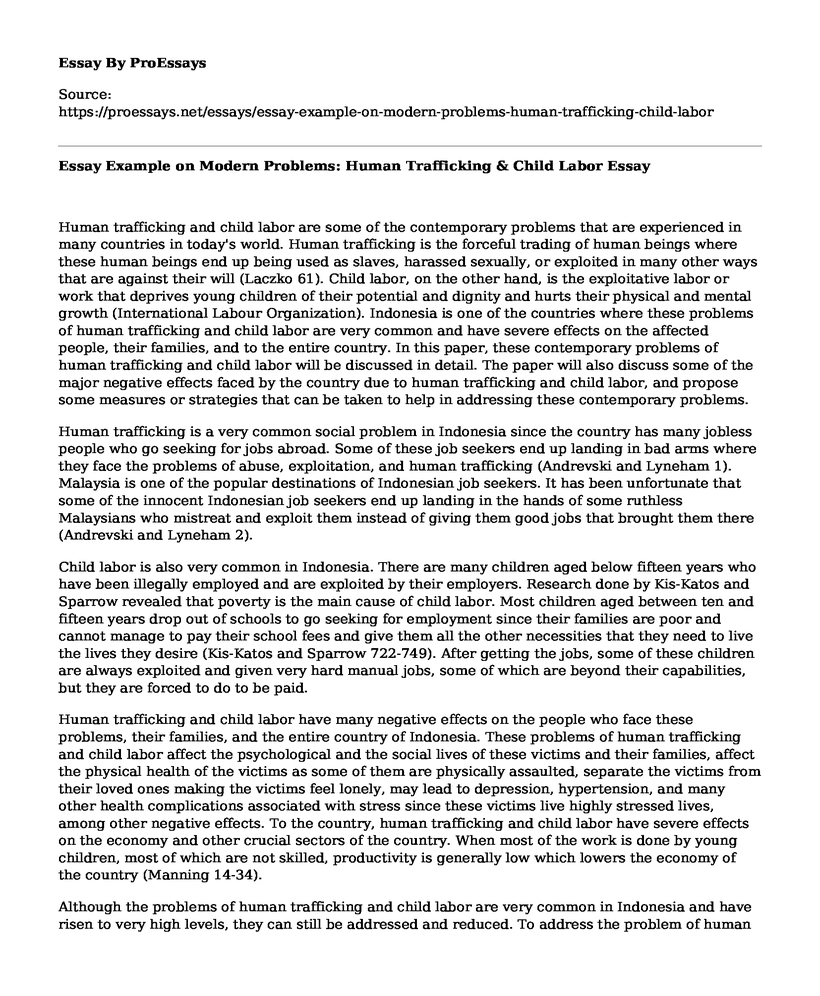Human trafficking and child labor are some of the contemporary problems that are experienced in many countries in today's world. Human trafficking is the forceful trading of human beings where these human beings end up being used as slaves, harassed sexually, or exploited in many other ways that are against their will (Laczko 61). Child labor, on the other hand, is the exploitative labor or work that deprives young children of their potential and dignity and hurts their physical and mental growth (International Labour Organization). Indonesia is one of the countries where these problems of human trafficking and child labor are very common and have severe effects on the affected people, their families, and to the entire country. In this paper, these contemporary problems of human trafficking and child labor will be discussed in detail. The paper will also discuss some of the major negative effects faced by the country due to human trafficking and child labor, and propose some measures or strategies that can be taken to help in addressing these contemporary problems.
Human trafficking is a very common social problem in Indonesia since the country has many jobless people who go seeking for jobs abroad. Some of these job seekers end up landing in bad arms where they face the problems of abuse, exploitation, and human trafficking (Andrevski and Lyneham 1). Malaysia is one of the popular destinations of Indonesian job seekers. It has been unfortunate that some of the innocent Indonesian job seekers end up landing in the hands of some ruthless Malaysians who mistreat and exploit them instead of giving them good jobs that brought them there (Andrevski and Lyneham 2).
Child labor is also very common in Indonesia. There are many children aged below fifteen years who have been illegally employed and are exploited by their employers. Research done by Kis-Katos and Sparrow revealed that poverty is the main cause of child labor. Most children aged between ten and fifteen years drop out of schools to go seeking for employment since their families are poor and cannot manage to pay their school fees and give them all the other necessities that they need to live the lives they desire (Kis-Katos and Sparrow 722-749). After getting the jobs, some of these children are always exploited and given very hard manual jobs, some of which are beyond their capabilities, but they are forced to do to be paid.
Human trafficking and child labor have many negative effects on the people who face these problems, their families, and the entire country of Indonesia. These problems of human trafficking and child labor affect the psychological and the social lives of these victims and their families, affect the physical health of the victims as some of them are physically assaulted, separate the victims from their loved ones making the victims feel lonely, may lead to depression, hypertension, and many other health complications associated with stress since these victims live highly stressed lives, among other negative effects. To the country, human trafficking and child labor have severe effects on the economy and other crucial sectors of the country. When most of the work is done by young children, most of which are not skilled, productivity is generally low which lowers the economy of the country (Manning 14-34).
Although the problems of human trafficking and child labor are very common in Indonesia and have risen to very high levels, they can still be addressed and reduced. To address the problem of human trafficking, the Indonesian government, the concerned international agencies, and the concerned NGOs should work together to formulate some rules and policies that can be implemented to fight these problems (Elezi). Similar efforts should be put in the fight against child labor, and with these efforts, these two serious contemporary problems will be significantly reduced.
Works Cited
Andrevski, Hannah, and Samantha Lyneham. "Experiences of exploitation and human trafficking among a sample of Indonesian migrant domestic workers." Trends and issues in crime and criminal justice 471 (2014): 1-10.
Elezi, Alketa. "FIGHTING HUMAN TRAFFICKING." Juridical Current 14.1 (2011).
International Labour Organization. What is child labour, IPEC, https://www.ilo.org/ipec/facts/lang--en/index.htm Accessed 2020
Kis-Katos, Krisztina, and Robert Sparrow. "Child labor and trade liberalization in Indonesia." Journal of Human Resources 46.4 (2011): 722-749.
Laczko, Frank. "Human trafficking: the need for better data." Migration Information Source 1 (2002): 61-80.
Manning, Chris. "The economic crisis and child labor in Indonesia." ILO/IPEC Working Paper (2000): 14-34.
Cite this page
Essay Example on Modern Problems: Human Trafficking & Child Labor. (2023, Apr 09). Retrieved from https://proessays.net/essays/essay-example-on-modern-problems-human-trafficking-child-labor
If you are the original author of this essay and no longer wish to have it published on the ProEssays website, please click below to request its removal:
- Essay on Body Cameras on Police Officers
- Case Study Example: Health and Social Care for Carol's Family
- Essay on School Shootings and Ways to Prevent Them
- The Effectiveness of Needle Exchange Programs Essay
- Essay Sample on Cyber Terrorism
- Gun Control Debate: 2nd Amendment Interpretation Impacts Lives - Essay Sample
- Paper Example on Living in Between: Lahiri's Struggle to Balance Indian & American Identities







